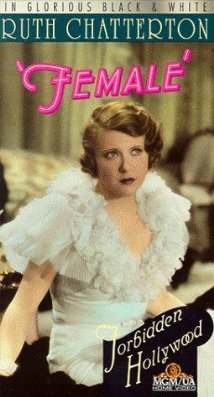
FEMALE
US 1933, 60 minutes, Black and white.
Ruth Chatterton, George Brent, Lois Wilson, Johnny Mack Brown, Ruth Donnelly, Ferdinand Gottschalk.
Directed by Michael Curtiz.
Female is a brief film from Warner Brothers in the early 1930s.It is a star vehicle for Ruth Chatterton and an early performance from George Brent. There are the usual touches from Ruth Donnelly and Ferdinand Gottschalk as an advisor in a rather ambiguously sinister performance.
From the title, it seems like a pioneer film in feminism. Ruth Chatterton plays the manager of a car building firm, inherited from her father, very efficient in management, seeming cold to those she works with, but enjoying the thrill of business action. She has a low opinion of men and decides that she would act like a man, especially in terms of relationships with men in the office, inviting them to dinner at home, being somewhat seductive, and then ignoring them or moving them on.
A crisis comes when she encounters an inventor, played by George Brent, at a shooting gallery – and he doesn’t know who she is, and surprised when he finds her running the company. There are discussions about her role as a woman, the place of family, love and romance. There is also discussion of dominant men wanting to protect women, the status quo.
Ultimately, perhaps because this is the 1930s, the woman decides that she will opt for love, out of the business, relying on the man with whom she has fallen in love. Interesting views of the feminism of the time. The film was directed by Michael Curtiz, directing small firms at Warner Brothers then moving into many significant films including Captain Blood, The Charge of the Light Brigade…
1. The title, expectations, the status of women, 1930s, the women’s movement, traditional ideas, in business, at home, families and children? The perspective of the feminism?
2. Black-and-white photography, the car the plant, offices, mansions, the clubs and outings, the ride to New York City? The musical score?
3. The brief plot, the focus on Alison, inheriting the company from father, her management, the meetings, brusque, decisions, phone calls, meetings? Wanting better promotion? The company and its difficulties? Audience response to her as the manager of the company, in the 1930s – and the comments about her withdrawing and going to make a family?
4. Alison, deciding to act like a man in business, the men and the attraction towards her, her inviting them home, her clothes, the vodka, the cautions, the touch of the seductive, swimming, suggestions of relationship, sending them home, ignoring them after or transferring them?
5. The relationship with Pettigrew, his advice, seeming sinister, even lewd? His attraction towards Miss Frothingham and the touch of suggestiveness?
6. Alison, her friend arriving, memories of the past, Harriet and her family, the welcome, the dinner, the comparison?
7. The decision to hire Thorne, to break his contract, the automatic gear?
8. Alison, wanting to be anonymous, the carnival, the shooting gallery, the encounter with Thorne, the shooting gallery, his spending the evening with her, seeing her as a pickup? His surprise to find that she was the boss? Her inviting him to the house, his wanting to do business, trying to be seductive, his not responding? The picnic, the tricking him, a happy afternoon, his misinterpretation, the marriage license, her reaction? His leaving?
9. The board meeting, indecision, her going in pursuit, the drive, the gallery, going to New York, the shooting, her decision and discussions about being a wife and mother, managing the factory with him, the image of the dominant male and the submissive female?
10. The film in light of the attitudes of the times, towards women? In later decades?